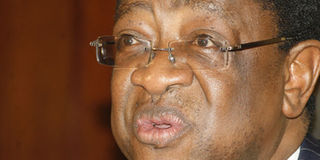ICC cases: Kenya denied hearing

Attorney General Amos Wako. The International Criminal Court Pre-Trial Chamber has denied government a chance to make submission over the application challenging the cases against the Ocampo Six April 5, 2011. FILE
The Kenyan Government will not brief the Pre-Trial Chamber on its application to challenge the admissibility of the post-election violence cases during the appearance of the Ocampo Six at The Hague.
In a ruling on Monday, the ICC judges also rejected a request by Kenya that the Chamber convenes a status conference involving all parties to discuss the Kenyan application. Instead, the ICC judges have requested the Prosecutor, the Defence and Victims to make written submissions on the Kenyan government application before April 28 at 4pm.
“In response, the Chamber, being keen to expedite the proceedings and avoid any unnecessary delay, deems it sufficient to confine the engagement of the parties in the article 19 proceedings to providing written observations as dictated by rules 58(3) and 59(3) of the Rules. Accordingly, the Chamber considers that the Government’s Second Request should be rejected,” the judges said.
The judges in their ruling said that they had examined the three requests put forth by the Kenyan Government and considers that in order to be in a position to rule on the inadmissibility of the case, it must initially address the matters relating to the organisation of the proceedings.
Further the judges said that as indicated in a previous ruling against the participation on victims on Thursday and Friday, the initial appearance hearing “has a limited purpose and scope”.
“Moreover, the fact that the Government of Kenya is a party to the article 19 proceedings does not mean per se that it is a party to the criminal proceedings against the suspects, which would allow its participation during the initial appearance hearing,” said the judges.
The Pre-Trial Chamber also made a decision that the Office of Public Counsel for Victims shall represent those victims who make submissions when proceedings on the Kenyan government application are conducted.
They added that in order to ensure the “proper and expeditious conduct” of the admissibility proceedings and because no victim has been recognised yet in the present case, the OPCV should represent those who have submitted applications to participate in the proceedings of the Ocampo Six.
Despite having dissented to the issuance of summonses against the Ocampo Six judge Hans-Peter Kaul appended a declaration that he concurs with the latest decision. He however said that his concurrence was “limited to the purposes of the present decision and is without prejudice” to his dissenting opinion where he said that the ICC lacks jurisdiction in the Kenyan case.
In an application filed on its behalf by two British lawyers last week, the government says that it is seeking an opportunity to demonstrate to the ICC that it can handle the post-election violence cases and asked to be allocated time on Thursday and Friday.
“The Government requests that it be afforded a separate time allocation to have an opportunity to address briefly the Pre-Trial Chamber on one or both of the hearings’ days of 7/8 April 2011, as the Court may decide in circumstances where the parties can be present,” the application filed by Queen Counsels, Sir Geoffrey Nice and Mr Rodney Dixon reads.
The Kenyan government has committed itself to investigating and prosecuting post-election violence cases by September this year. This is contained in a timetable in the application to give progress reports on investigations and prosecutions with a deadline of September 2011.
The Kenyan Government has requested that the Chamber determines that the cases, against six of its citizens for whom summonses to appear have been issued, is inadmissible.
The six are Deputy Prime Minister Uhuru Kenyatta, Head of Civil Service Francis Muthaura, post-master general Hussein Ali, radio presenter Joshua Sang and suspended ministers William Ruto and Henry Kosgey.
The Kenyan application made public yesterday says that during the period preceding September, the government will have made the necessary changes in the Judiciary and the Police. The application filed which was filed on Thursday under the authority of Attorney General Amos Wako anchors Kenya’s case on the new Constitution and ongoing reforms.
The application contains a time table that illustrates the government’s plan in dealing with the cases. It says that by the end of July 2011, the government will give a report on investigations under the new Director of Public Prosecutions and how they extend up to the highest levels.
“The structure of the new office and the manner in which investigations are being undertaken to ensure independence and efficiency will also be addressed,” the application says.
In August, the government will report on progress made with investigations to the highest levels, and on adoption of the three Police Bills and reorganisation of the police services, including the appointment of the new Inspector-General.
In September, the report will highlight the progress made with investigations and readiness for trials in light of judicial reforms.
The application says that by this time the necessary judicial reforms will have been implemented for the investigations to take their course in prosecutions before the courts.




